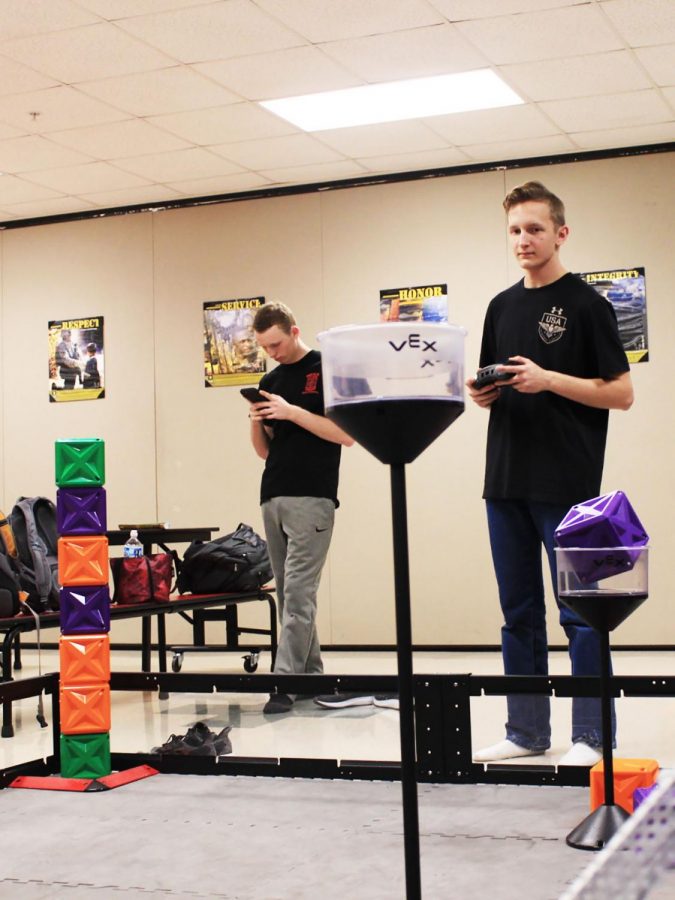Making it Work: The Nixa High School Robotics Team has been successful in recent competitions
AJ McNeal is the captain of the robotics team and pilots the robot the students have built. He is the only one who pilots the robot in competitions.
February 25, 2020
STORY BY: Madalyn Tuning
Copy Editor
Everyone imagines a robot made to fight, but the Nixa Robotics Team works to accomplish a task. They have created a machine capable of being piloted to carry out a goal in order to win.
“Our mission is to create robots designed to be piloted and programmed to complete various tasks depending on the competition requirements for that year,” sophomore Allen McNeal said.
This year, the teams must create a robot that can stack colored blocks with different point values to their designated corners in the stadium in order to gain points. The match is constantly changing, forcing team members to adapt on the spot.
McNeal has been the captain of the Robotics Team for the last two years. He was a part of the Lego Robotics program at JTSD from 3rd-6th grade. In junior high, because there was no robotics team, McNeal coached JTSD teams. Nixa High School’s Sgt. Hodapp had interest in the robotics team, and McNeal expressed his passion for it and became captain once the team was initiated.
“It’s a lot of responsibility,” McNeal said. “All the successes and failures rest entirely on your shoulders. You’re held accountable for everything that happens on that team. It’s your job to keep your teammates on track and on task to make sure that things get done on a deadline; to make sure that everything is ready to go for competitions.”
McNeal notifies students of schedule changes and reminders of meetings. He plays an important role in keeping his teammates informed and reformed to compete every other weekend.
Senior Ariel Sheckley is the highest ranking student in NHS’s Junior Reserve Officer Training Corps and she is a key member of the robotics team this year. She is in charge of recording everything pertaining to their robot and turning it in before a competition.
“You don’t just come in and you’re a leader,” Sheckley said. “You have to learn how to do it and gain that respect from other people.”
She has always been interested in technological programs, but believes she still has a bit to work on to benefit the team.
“I really enjoy being able to make something out of nothing and then watching it actually work,” Sheckley said.
Last year, the robotics team started because a pair of senators wanted JROTC to begin a STEM program in order to advance students with technology. Hodapp, assistant instructor for JROTC of 12 years, is the sponsor for the robotics team and has a background in electronics.
“We got started super late because we didn’t get our equipment until late October, so by the time we got it and were able to troubleshoot everything, problem solve and come up with a viable robot that could compete, we were already past Christmas break,” Hodapp said. “The first competition, we didn’t get to go to until February.”
Nixa was lucky to be able to begin the pilot program last year.
“We got chosen because I had an interest in it,” Hodapp said. “Our brigade needed somebody to pilot it, and since I had already reached out to them, they said, ‘alright you go ahead and do it.’”
Nixa has fewer than 10 students with an A team and a B team, but are looking into expanding. They aren’t accepting new members until the 2020-21 school year because it would be too hard for them to keep up in the middle of the current year.
“We have several people who are interested who want to join next year,” McNeal said. “Only JROTC students are allowed on our teams currently because it is not funded by the school district. It’s actually only funded by the government and the 7th Brigade JROTC Program. We started last year as a pilot program, and our hope is that if we can gain enough traction and get the word out about the robotics teams, maybe we can get more support from the school district. For us to be able to have a competition, and have a robotics team, it obviously has to be funded.”
Robotics just needs money to start programs for ‘civilians,’ which are students who are not in JROTC, as well.
“We want it to be an equal opportunity for all students to join,” McNeal said. “As soon as we get the financial support and the backing that will help us for transportation, food, registration for the competitions, the robot kits themselves — because those are very expensive — that’s not just something we have out of pocket. We have to get that money from somewhere.”
Robotics is not quite what all students assume it might be. It does not have a military heavy curriculum, but it does not involve creating robots of destruction.
“That’s a big misconception — everyone is like, ‘oh it’s battle bots,’ and we’re like, ‘yeah, we wish, but no,’” Sheckley said.
Sheckley stresses that civilian students shouldn’t be afraid of working with the JROTC program in order to create robots for competitions; they all have the same plan.
“I hope we can get more people,” Sheckley said. “I know a lot of people are interested, but I know the people in the program — they’re already on several other teams that JROTC offers. … We’ve kind of toyed with the idea of making it open to non-JROTC people. They can learn about robots and learn about the program because it’s so cool, and we want to share it with other people.”
Students learn how to work with others they’ve never met because each team is randomly selected for an ally who they must work together with in order to defeat another alliance duo.
“You have to be able to work well with other teams, build upon their strengths and fill in the spots where they may be lacking,” McNeal said. “If one team is good at something, you can work with them and synergize with the other teams so that you can create a winning combination.”
Students also make friendships among the allies they must work with; Nixa has allied with the same team before — and the teams they see at every tournament. There are teams from all over Missouri and some surrounding states, so there are dozens of teams competing.
“We got first place in this last competition [Jan. 18],” McNeal said. “A really cool statistic we like to share is that we’ve never placed anywhere but the top five in any of our past five or six competitions.”
The Nixa Robotics Team has gotten below first but above fifth several times in the past, and are proud to finally have won first.
“There’s a lot of motivation in our student group, a lot of interest, and they’re self-motivated,” McNeal said. “I think that works miracles for the standings and placements for robotics competitions.”
Students have worked hard enough to make themselves known for accomplishments.
“I think they’re at a point now where, unless they have serious mechanical issues, they should be fairly successful,” Hodapp said.
The Nixa team is on track to continue winning, but if there are surprise technical issues, they have enough supplies to rebuild a new robot.
“We’re kind of fortunate with that because we go to these competitions and a lot of these teams — they’re not very well funded by their schools, so they’ll literally come with just with what they have,” Hodapp said. “They might have a couple replacement parts, but if something major goes down, they’re done.
One match that stood out the most was when the Nixa team went against the No. 1 team in Missouri. Nixa was very close to winning, showing them that they could compare to the state best.
“That competition really let us know that this is something we can do pretty well at, McNeal said. “This is definitely something worth our time and effort because the kids enjoy it. It’s fruitful, obviously, because we’ve had so many successes in the program. It’s a great opportunity for kids to meet other people if they don’t have a whole lot of friends.”
The team travels in a small van, usually several hours at a time, which allows the students to become close.
“One of my favorite times was this past competition,” Sheckley said. “We were having some problems with our robot and we weren’t sure we were going to make it. Then we encountered some kind of miracle and it started working perfectly. We won the
competition.”






